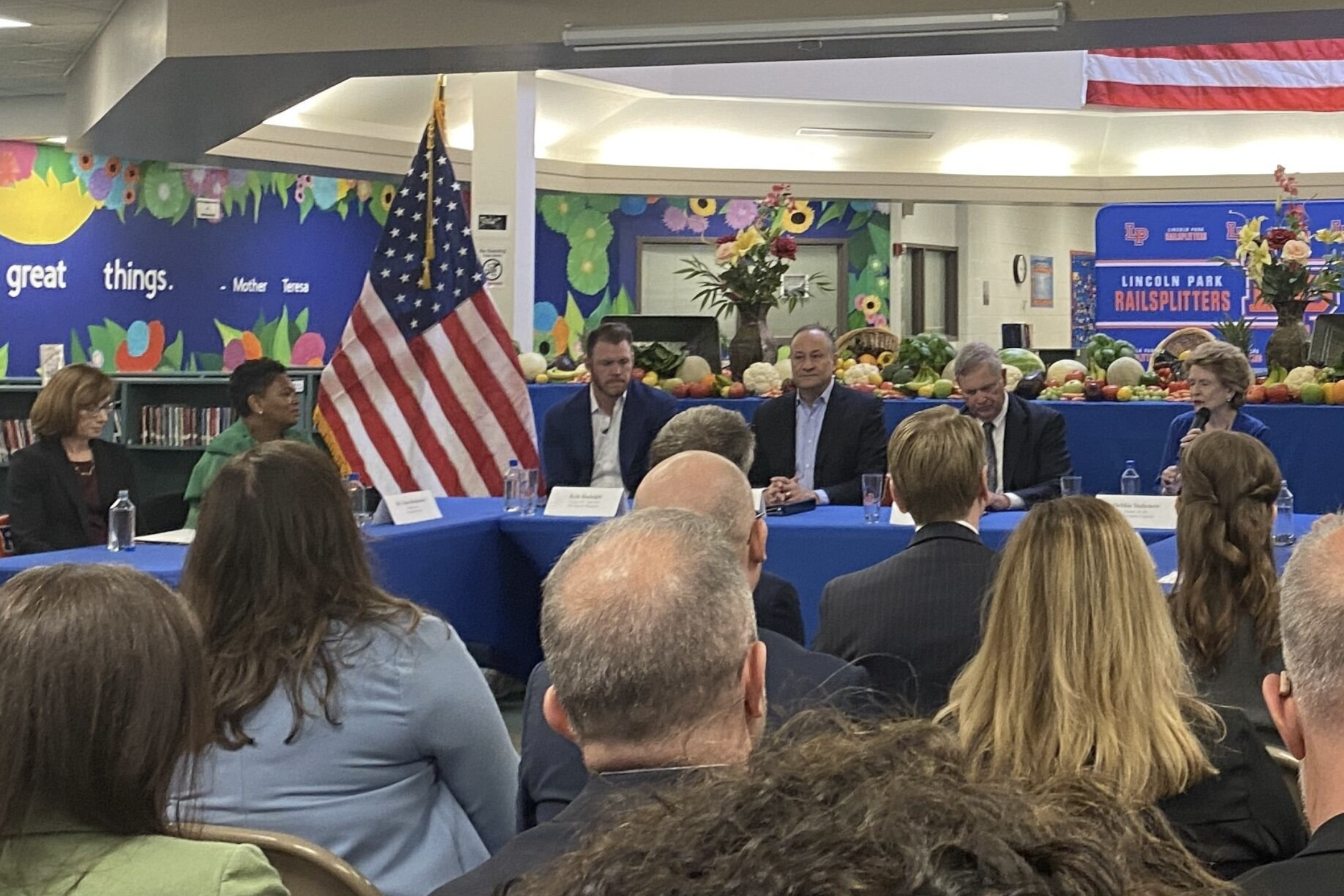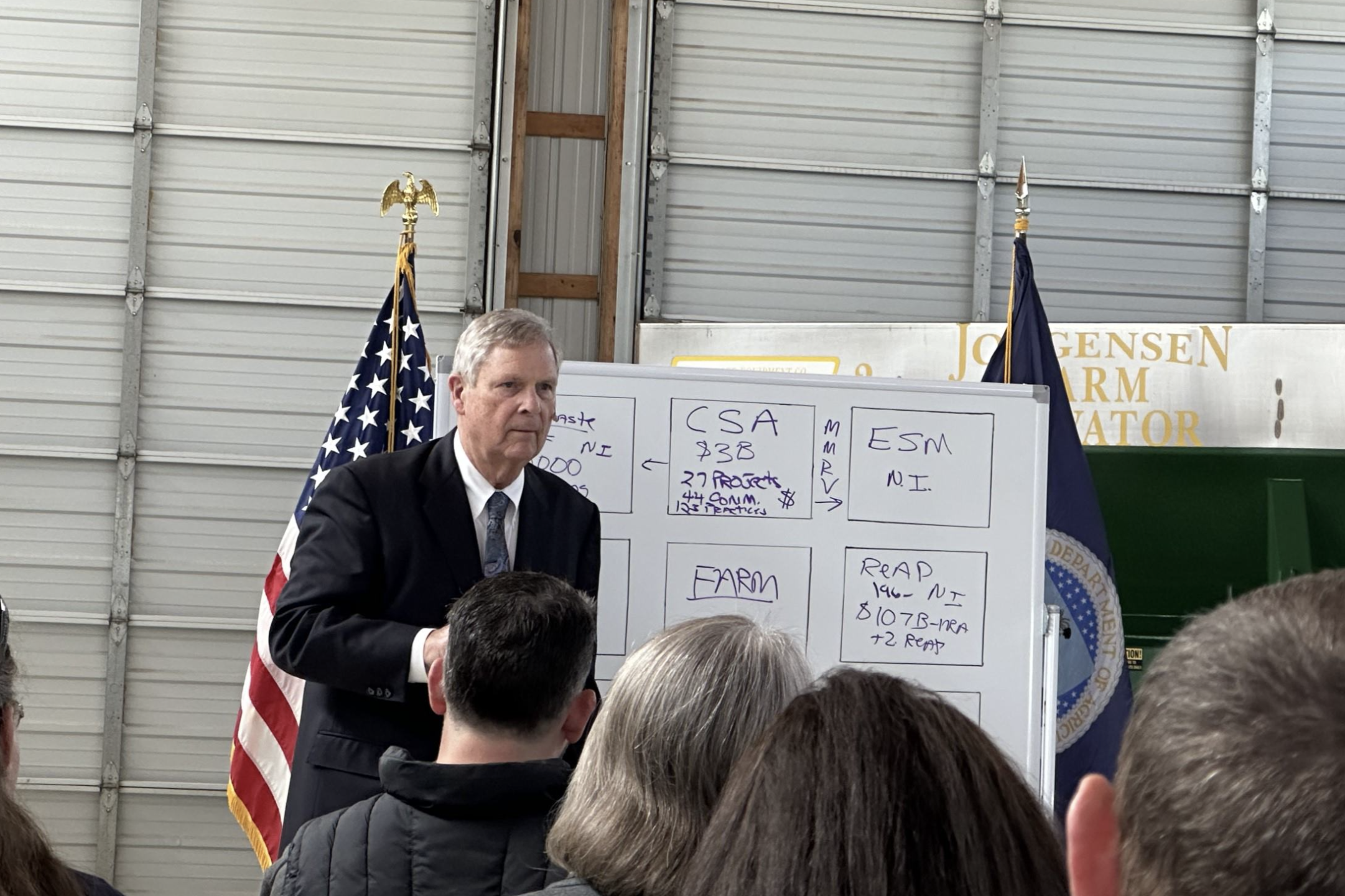Michigan child nutrition programs farm to school efforts recognized by Vilsack and Stabenow in recent events
Michigan farm to school programs were highlighted at recent events with USDA Secretary Vilsack, Senator Stabenow, and other policymakers.

Farm to school efforts in Michigan and across the country benefit children with healthy local food options during school meals and provide an expanding market for farmers. Michigan State University Center for Regional Food Systems (CRFS) team members, Colleen Matts, Director of the Great Lakes Midwest Regional Food Business Center and former Director, Farm to Institution Programs, and Megan McManus, Farm to Institution Specialist, recently attended events that underscore the powerful intersection between supporting farmers in connecting with new markets, like schools, and the positive health benefits for children.
On the morning of April 26, 2024, a School Nutrition Roundtable at Lincoln Park Middle School brought together U.S. Secretary of Agriculture Tom Vilsack, Second Gentleman of the United States Doug Emhoff, Senator Debbie Stabenow (D-MI), Dr. Diane Golzynski of Michigan Department of Education, and Cindy Long from the USDA Food and Nutrition Service to highlight the Biden-Harris Administration's efforts to improve kids' access to healthy school meals. The panel also included representatives from the Cleveland Clinic, NFL PLAY 60, and MomsRising a group that brings real world experiences of women and mothers to government representatives.
“We are in a movement - a food movement," Senator Stabenow said in introducing these new and ongoing efforts.
Recently, the USDA updated school nutrition standards to reduce the accepted levels of sugar and sodium in school meals. Another change allows schools to prioritize geographic preference when it comes to locally grown, raised, and caught products. This means that child nutrition programs can use their own definition of “local” when making purchases of unprocessed or minimally processed agricultural products. This final rule aims to advance the Administration's strategy to end hunger and reduce diet related disease by 2030. The White House Conference on Hunger, Nutrition and Health in September 2022 identified this as a significant goal.
Speakers at the Roundtable event noted the strength of Michigan farm to school efforts, including 10 Cents a Meal for Michigan's Kids & Farms (10 Cents a Meal). 10 Cents a Meal is a state program that provides schools and other non-school sponsors with up to 10 cents in matching funding per meal to purchase Michigan-grown fruits, vegetables, and dry beans. Secretary Vilsack said that Michigan is an “example of a state that’s doing it all and doing it all well” when it comes to school food and child nutrition programs.
Matts said that the update to the geographic preference rule bolsters the clear support for farm to school at the national level. When combined with opportunities through state-level programs like the Michigan School Meals Program and 10 Cents a Meal, this will continue to make it easier for school food program managers to properly procure and serve more local foods to more Michigan kids.

Later that day, Secretary Vilsack joined Representative Elissa Slotkin (MI-07) for an America Rural Prosperity Fireside Chat event at a farm in Williamston, MI. This event highlighted the ways the USDA is working to support farmers by building new and better markets and strengthening farming operations across the country. These efforts relate to President Biden's Investing in America agenda that looks to provide transformative new economic opportunities for small- and mid-size producers, families and businesses. Secretary Vilsack also shared updates and responses to the avian flu, a concern for farmers nationwide.
Through continued investment in farm to school efforts, and with the support of collaborative infrastructure from statewide entities like the Michigan Farm to Institution Network, farmers will benefit from new and expanded market opportunities and children will enjoy more nutritious school meals to support a healthier future.
About Michigan State University Center for Regional Food Systems
The Michigan State University Center for Regional Food Systems advances regionally-rooted food systems through applied research, education, and outreach. We do this by uniting the knowledge and experience of diverse stakeholders with that of MSU faculty and staff. Our work fosters a thriving economy, equity, and sustainability for Michigan, the nation, and the planet by advancing systems that produce food that is healthy, green, fair, and affordable.
Learn more at foodsystems.msu.edu



 Print
Print Email
Email




